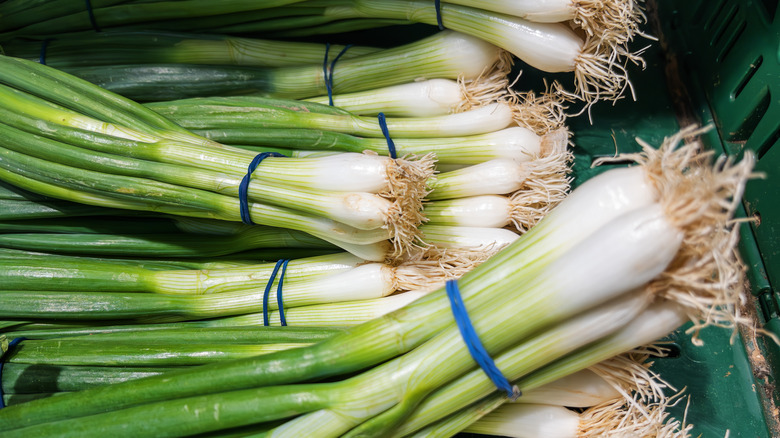If you’re a regular Trader Joe’s shopper, it’s time to inspect your produce drawer. On October 18, Trader Joe’s announced a recall of green onions due to potential salmonella contamination. The recall comes after Church Brothers Farms, in collaboration with the U.S. Food and Drug Administration (FDA), issued a voluntary recall of over 1,200 cases of green onions. The affected products were distributed across 29 states, raising concerns about consumer safety. Read on to find out if you’re impacted and what steps you need to take.
Details of the Trader Joe’s Green Onion Recall

Trader Joe’s initiated the recall after Church Brothers Farms reported potential salmonella contamination in the batch of green onions packed on September 25, 2024. According to the FDA, these green onions reached a limited number of retail and foodservice customers in both the U.S. and Canada, with many sold through Trader Joe’s outlets.
The states affected by the recall include Alabama, Connecticut, Delaware, Florida, Georgia, Iowa, Illinois, Indiana, Kansas, Kentucky, Massachusetts, Maine, Maryland, Michigan, Minnesota, Missouri, Nebraska, New Hampshire, New York, North Carolina, Ohio, Pennsylvania, Rhode Island, South Carolina, Tennessee, Vermont, Virginia, Washington DC, and Wisconsin. The recall notice urges customers in these states to check their green onions for the label “PACK DATE 09 25 24.”
If you’ve purchased green onions from Trader Joe’s recently, it’s crucial to verify the pack date immediately. If your product matches the recall description, do not consume it. Instead, discard it or return it to your nearest Trader Joe’s for a full refund.
Understanding Salmonella: What’s the Risk?
Salmonella is a bacteria that can cause foodborne illnesses. Although the contaminated food may look, smell, and even taste normal, it poses significant health risks if consumed. Here’s what you need to know about the potential dangers:
- Symptoms of Salmonellosis: The most common symptoms include diarrhea, abdominal cramps, and fever, typically appearing within 12 to 72 hours after eating contaminated food. While most people recover without treatment, the symptoms can last for up to a week, causing discomfort and dehydration.
- High-Risk Groups: Older adults, young children, pregnant women, and individuals with compromised immune systems are at greater risk of severe illness from salmonella exposure. In these cases, the infection can spread beyond the intestines to the bloodstream and other parts of the body, necessitating urgent medical care.
If you or someone in your household experiences these symptoms after consuming potentially contaminated green onions, seek medical attention promptly.
How Did the Contamination Occur? The Path to a Recall
Food recalls like this one often start with a routine test or inspection by food suppliers, retailers, or regulatory agencies like the FDA. In this instance, Church Brothers Farms identified the potential salmonella contamination during an inspection process. As a precautionary measure, the company issued a voluntary recall and alerted the FDA, which then prompted Trader Joe’s to recall the affected products.
The process underscores the importance of food safety protocols at every level of the supply chain. While this particular recall is voluntary, it reflects the industry’s effort to ensure consumer safety and minimize health risks.
What to Do If You Have Affected Green Onions in Your Home

Trader Joe’s has provided clear instructions for customers who may have purchased the recalled green onions:
- Inspect the Pack Date: Check your green onions for the “PACK DATE 09 25 24” label. If it matches, the product falls under the recall.
- Dispose or Return: Trader Joe’s urges customers not to consume the recalled green onions. You can either discard them safely or return them to any Trader Joe’s location for a full refund.
- Contact a Health Care Provider: If you suspect you’ve consumed the contaminated product and are experiencing symptoms, contact a healthcare provider to discuss your symptoms and receive appropriate care.
Trader Joe’s and the FDA are also encouraging customers to spread awareness of the recall to help prevent potential illness.
Why Food Recalls Happen: Ensuring Public Health
Food recalls are relatively common, occurring when a product is found to pose a risk to consumers. They can be initiated by producers, retailers, or regulatory bodies like the FDA. While some recalls are due to minor labeling errors or undeclared allergens, others, like the current Trader Joe’s recall, are related to potential contamination that could cause serious illness.
Recalls are often proactive steps to prevent outbreaks, protect consumers, and maintain public trust in food safety. Even when there are no reported illnesses, recalls are a critical precautionary measure. In the case of the Trader Joe’s green onion recall, there have been no confirmed reports of illness so far. However, the swift action taken by Church Brothers Farms, Trader Joe’s, and the FDA emphasizes the importance of consumer safety.
Trader Joe’s Response: A Focus on Customer Safety

Trader Joe’s has built a reputation for transparency and responsiveness when it comes to product recalls. In this instance, the retailer quickly issued a public statement, providing detailed information about the recall and clear instructions for affected customers. Trader Joe’s is known for its commitment to customer safety, often erring on the side of caution with food recalls.
The recall announcement also reflects Trader Joe’s broader approach to quality control, as the retailer consistently monitors its supply chain to identify potential risks. By collaborating with suppliers like Church Brothers Farms, Trader Joe’s ensures that food safety standards are maintained throughout the distribution process.
Conclusion: Stay Informed and Safe
The recall of green onions at Trader Joe’s is a reminder of the importance of staying informed about potential food safety issues. While plant-based diets and fresh produce are often associated with healthier eating, contamination risks can arise at any point in the food supply chain. As a consumer, it’s essential to be vigilant, check product labels, and respond promptly to recall notices.
If you’ve purchased green onions from Trader Joe’s recently, take the time to check your refrigerator and ensure that your produce is safe to consume. Whether you choose to dispose of the affected product or return it for a refund, your health comes first. By staying alert and informed, you can help protect yourself and your family from foodborne illnesses like salmonella.
Stay safe, and always double-check your produce!


